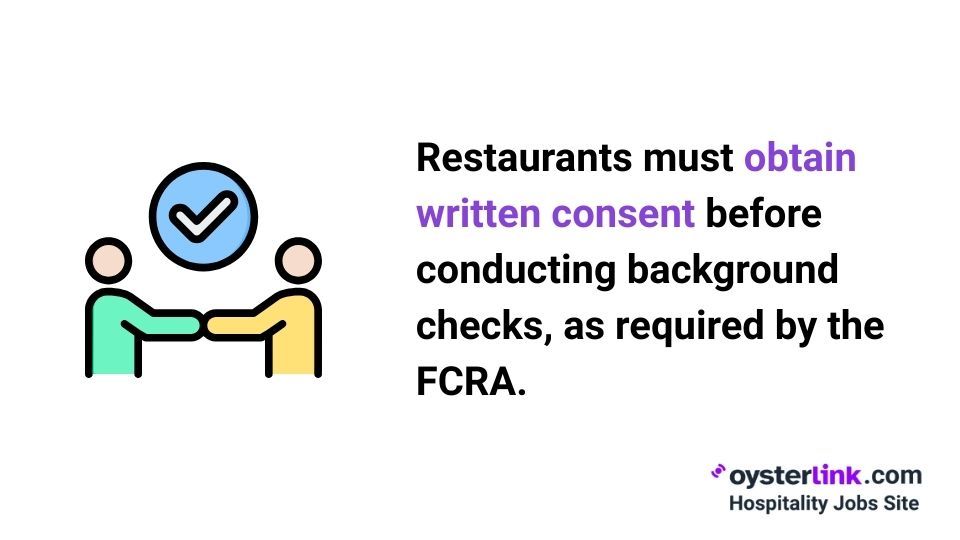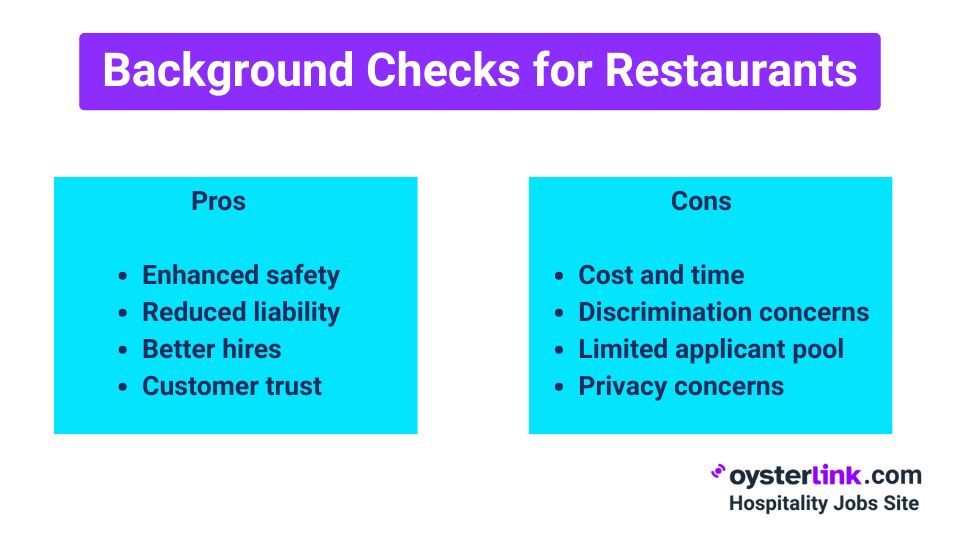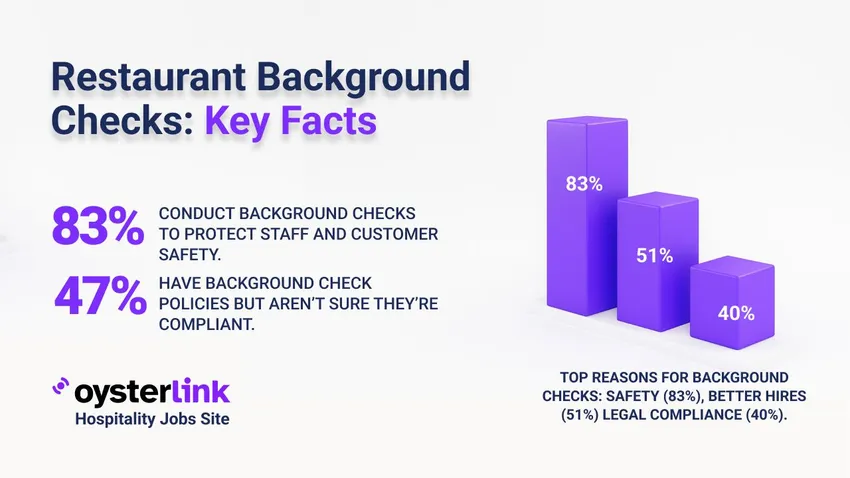For those wondering, "Do restaurants do background checks?" — the short answer is yes, though it’s not always standard practice. This guide explores when and why restaurant background checks are conducted, how they’re implemented and what they mean for both employers and job seekers.
Why Do Restaurants Do Background Checks?
Background checks help ensure trustworthy individuals are hired. After all, safety and security are essential in any workplace — and restaurants are no exception.
A survey found that the top reasons for conducting background checks are to protect the safety of employees and customers (83%), improve the quality of hires (51%) and comply with legal requirements (40%).
Verifying an applicant's history not only ensures a safer environment. It also helps identify candidates who are better suited for the role, reducing the likelihood of turnover and improving overall team performance.
Background checks also play a crucial role in legal compliance. Certain positions especially those involving alcohol service or working with minors may have specific regulations mandating these screenings.
By conducting background checks, restaurants meet legal requirements while strengthening the reliability and professionalism of their hiring practices.
Landscape of Restaurant Background Checks and Hiring Practices
Hiring practices vary widely across the restaurant industry — from quick bistros to large chains, each has its own approach to background screening.
Many establishments prioritize speed, especially during busy seasons, which can lead to skipping thorough checks. But growing concerns around employee theft, customer safety, and legal risks are prompting more restaurants to adopt formal screening policies.
Still, implementing these policies isn’t always straightforward. According to a Checkr survey, 47% of employers have a background check policy but aren’t confident it complies with all federal, state, and local laws — highlighting ongoing uncertainty even among those trying to do the right thing.
Types of Restaurant Background Checks Employers May Perform
When restaurants decide to conduct background checks, they have several options at their disposal. The type and extent of screening often depend on the position being filled and the restaurant's resources.
- Criminal background checks are among the most common. These searches typically look for convictions at the county, state or federal level.
- Employment verification is another crucial aspect. Restaurants may contact previous employers to confirm work history, especially for roles requiring specific experience, such as Sous Chefs or Pastry Chefs.
- Credit checks, while less common in the restaurant industry, might be conducted for positions involving financial responsibilities. This could apply to roles like Restaurant Managers who oversee budgets and financial operations.
- Drug testing is another form of screening some restaurants implement, particularly for safety-sensitive positions in the kitchen or those involving heavy machinery operations.
Legal Considerations for Restaurant Background Checks
Employers must navigate numerous legal considerations to ensure compliance with various regulations.
The Fair Credit Reporting Act (FCRA) is a crucial piece of legislation that governs how background checks are conducted and used in hiring decisions.
Under this act, restaurants must obtain written consent from applicants before conducting a background check. They must also provide notice if they plan to take adverse action based on the results.

State and local laws add another layer of complexity. Some jurisdictions have "Ban the Box" laws that prohibit employers from asking about criminal history on initial job applications.
These laws aim to give applicants a fair chance at employment without being immediately disqualified due to past mistakes.
Restaurants must also be cautious about how they use the information obtained through background checks. The Equal Employment Opportunity Commission (EEOC) provides guidelines to prevent discriminatory hiring practices.
For instance, blanket policies that automatically disqualify candidates with any criminal history could be seen as discriminatory if they disproportionately affect certain protected groups.
Pros and Cons of Restaurant Background Checks
Implementing background checks in restaurants comes with both advantages and drawbacks that owners and managers must carefully weigh.
Pros
- Enhanced safety: Background checks can help create a safer environment for both staff and customers by identifying potentially risky hires.
- Reduced liability: By thoroughly vetting employees, restaurants can minimize the risk of negligent hiring claims.
- Improved quality of hires: Verifying employment history and qualifications can lead to a more skilled and reliable workforce.
- Customer trust: Knowing that staff members have been screened can increase customer confidence in the establishment.
Cons
- Cost and time: Conducting thorough background checks can be expensive and time-consuming, especially for smaller restaurants with limited resources.
- Potential discrimination concerns: If not implemented carefully, background check policies could lead to unintended discrimination against certain groups.
- Limited applicant pool: Strict background check requirements might deter some qualified candidates from applying, particularly in tight labor markets.
- Privacy concerns: Some applicants may feel uncomfortable with extensive background checks, viewing them as an invasion of privacy.

Best Practices for Implementing Restaurant Background Checks
For individuals seeking employment in the restaurant industry, the prospect of background checks can be daunting — especially for those with past convictions or financial difficulties.
Over 90% of U.S. employers conduct criminal background checks before making a hiring decision, according to the National Employment Law Project.
It's important for job seekers to understand their rights in the hiring process. Under the FCRA, applicants have the right to be informed if information from a background check is used against them. They also have the right to dispute any inaccuracies in the report.
Transparency is key for applicants with potential red flags in their background. Being upfront about past issues and demonstrating rehabilitation efforts can sometimes favor a candidate. Many restaurants are willing to consider the circumstances and nature of past offenses, especially if they're unrelated to the job duties.
For positions like Line Cooks or Prep Cooks, where direct customer interaction is limited, some restaurants may be more lenient in their background check policies.
This can provide opportunities for individuals looking to rebuild their careers in the food service industry.
Restaurant Background Checks? – Key Considerations for Hiring
The decision to conduct background checks in restaurants involves balancing safety concerns, legal compliance and operational needs.
While these screenings can provide valuable insights and protect businesses, they must be implemented thoughtfully and fairly.
As the industry evolves, restaurants need to adapt their hiring practices to meet changing expectations while ensuring a safe and welcoming environment for staff and customers alike.










Loading comments...